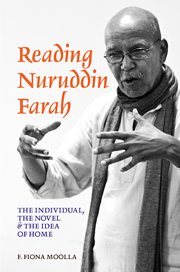Book contents
- Frontmatter
- Contents
- Introduction
- 1 Defining the Individual: Conceptual & Historical Limits
- 2 From a Crooked Rib & the Bildungsroman: Developing the Self, Developing the Nation
- 3 The ‘Gynocentric’ Bildungsroman: Sardines & Gifts
- 4 Modernism in A Naked Needle & Sweet & Sour Milk: Irony, Morality & the Aesthetic
- 5 Close Sesame & the Representation of Heteronomy
- 6 Dissolving the Boundaries of Self & Nation in Maps & Secrets
- 7 Reconstructing the Subject in the Third Trilogy: Links, Knots & Crosbones
- Conclusion
- Bibliography
- Index
7 - Reconstructing the Subject in the Third Trilogy: Links, Knots & Crosbones
Published online by Cambridge University Press: 05 April 2014
- Frontmatter
- Contents
- Introduction
- 1 Defining the Individual: Conceptual & Historical Limits
- 2 From a Crooked Rib & the Bildungsroman: Developing the Self, Developing the Nation
- 3 The ‘Gynocentric’ Bildungsroman: Sardines & Gifts
- 4 Modernism in A Naked Needle & Sweet & Sour Milk: Irony, Morality & the Aesthetic
- 5 Close Sesame & the Representation of Heteronomy
- 6 Dissolving the Boundaries of Self & Nation in Maps & Secrets
- 7 Reconstructing the Subject in the Third Trilogy: Links, Knots & Crosbones
- Conclusion
- Bibliography
- Index
Summary
This chapter focuses on the novels of the “Past Imperfect” trilogy, Links, Knots and Crossbones. The chapter shows that the radically fragmented identity which was suggested by the novels of the second trilogy is ultimately at odds with Farah's commitment to the reconstruction of the Somali state and society, even though this split subjectivity seems to connote freedom. The novels of the third trilogy trace a return to some form of centred subjectivity. The protagonist in Links is a relatively coherent subject whose quest, in part, involves forming associational bonds with others which do not existentially bind the subject. Knots explores in more detail the nature of the strategically centred subject which Links assumes. Ideas of “performative” subjectivity run through Knots. The subject is no longer schizophrenically split. Now the relatively coherent subject, in a model drawn from theatre, assumes different personae (masks) responding to the exigencies of various contexts. The performative subjectivity presented in Knots enjoys a coherency which permits agency. But this subjectivity does not appear to be formed in relation to any idea of ultimate truth, whether internal, located in individual reason, emotion or spirit; or external, oriented in relation to a traditional or religious code. The coherent subject, whose role is determined entirely contextually, seems, with a justification internal to itself, to be able to exclude those forms of subjectivity which acknowledge an external ethics. In some ways the journey traced by Farah's novels is a journey which returns to a transformed type of realist subjectivity.
- Type
- Chapter
- Information
- Reading Nuruddin FarahThe Individual, the Novel and the Idea of Home, pp. 155 - 185Publisher: Boydell & BrewerPrint publication year: 2014



